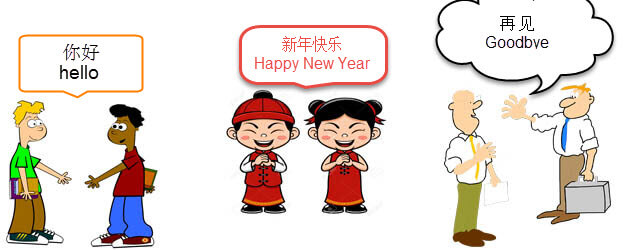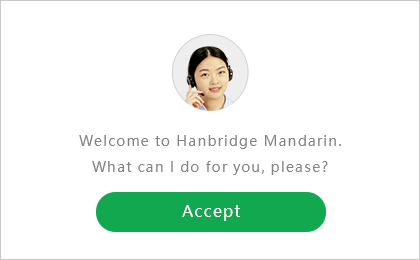Learn Basic Chinese Greetings and Responses
Posted by Julia Song 16828

There are many different ways of doing greetings in Chinese, including Hello and goodbye, Good morning/afternoon/evening, goodnight, happy New Year and so on. In most cases these expressions are quite short, easy, and neatly matched with English equivalents.
nǐ hǎo
你好 hello
nǐ hǎo mɑ
你 好 吗 how are you
hěn ɡāo xìnɡ rèn shí nǐ
很 高兴 认识 你 nice to meet you
wǒ yě hěn ɡāo xìnɡ rèn shí nǐ
我 也 很 高兴 认识 你 I'm also glad to meet you
zǎo shang hǎo
早上 好 good morning
wǎn shɑnɡ hǎo
晚上 好 good evening
háo jiǔ bú jiàn
好久不见 long time no see
xiè xie
谢 谢 thanks
bú kè qi
不 客 气 you're welcome
nǐ tài kè qi le
你太客气了 you're welcome
duì bù qǐ
对 不 起 sorry
méi ɡuān xi
没 关 系 It doesn't matter
zài jiàn
再 见 bye bye
mínɡ tiān jiàn
明 天 见 see you tomorrow
xīn nián kuài lè
新 年 快 乐 happy new year
ɡōnɡ xǐ ɡōnɡ xǐ
恭 喜 恭 喜 congratulations
shēnɡ rì kuài lè
生 日 快乐 happy birthday
At the same time, as the eastern culture behind it, Chinese offers a body of special greeting expressions quite different from those in English. For example, Chinese greetings can be very personal and may sound annoying for English speakers. One may naturally ask whether you had had meal:
chī le mɑ ?
吃 了 吗 ?
or the place you are heading for:
qù nǎ ér ā ?
去哪儿 啊 ?
These factual questions on personal information is seemed quite rude to westerners, but is a symbol of closeness and citizenship for Chinese. So, be bold enough to greet your Chinese friend with chī le mɑ, he will definitely be stunned with joy.
Another interesting thing about greetings is the expected answers to it. Basically, small talks like greetings are not expected with a very specific response. When you ask qù nǎ ér ā, you don't need to report your destinations in detail, but just a very short:
qù chī fàn
去 吃 饭 going for lunch










